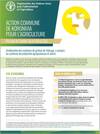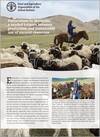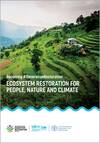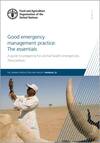Au Burkina Faso, l’exacerbation des conflits liés aux ressources naturelles et la dégradation rapide de l’insécurité constituent une source de préoccupation majeure, à la fois pour les pouvoirs publics et pour les populations. De manière générale, l’objectif de la présente note de synthèse consiste à: (i) dresser l’inventaire des conflits liés aux ressources naturelles et des autres conflits dans l’espace rural; (ii) identifier des initiatives en matière de prévention et de gestion des conflits; et (iii) formuler des propositions pour améliorer l’efficacité des mécanismes de prévention et de gestion des conflits. L'analyse des conflits est l'une des principales activités mises en œuvre dans le cadre du projet de l'Organisation des Nations Unies pour l'alimentation et l'agriculture (FAO) intitulé «Renforcer la résilience des populations pastorales et agropastorales transfrontalières dans les zones prioritaires du Sahel» financé par le programme de partenariat FAO-Union européenne du Réseau mondial contre les crises alimentaires (GNAFC).
Year of publication: 2021Organization: Organisation des Nations Unies pour l'alimentation et l'agriculture (FAO)
Topic: Conflit
Language: Français
Type of document: Technique
Geographical coverage: Afrique occidentale
L'analyse des conflits a été menée pour dresser un état des lieux des conflits liés aux ressources naturelles et identifier des initiatives pour la prévention et la gestion des conflits dans les zones d’intervention du projet de l'Organisation des Nations Unies pour l'alimentation et l'agriculture (FAO) intitulé «Renforcer la résilience des populations pastorales et agropastorales transfrontalières dans les zones prioritaires du Sahel» financé par le programme de partenariat FAO-Union européenne du Réseau mondial contre les crises alimentaires (GNAFC).
Year of publication: 2021Organization: Organisation des Nations Unies pour l'alimentation et l'agriculture (FAO)
Topic: Conflit
Language: Français
Type of document: Technique
Geographical coverage: Afrique occidentale
This publication provides an overview of the common and unique sustainability elements of Indigenous Peoples' food systems, in terms of natural resource management, access to the market, diet diversity, indigenous peoples’ governance systems, and links to traditional knowledge and indigenous languages. While enhancing the learning on Indigenous Peoples food systems, it will raise awareness on the need to enhance the protection of Indigenous Peoples' food systems as a source of livelihood for the 476 million indigenous inhabitants in the world, while contributing to the Zero Hunger Goal.
Year of publication: 2021Organization: Organisation des Nations Unies pour l'alimentation et l'agriculture (FAO), Auteurs individuels
Topic: Sécurité alimentaire, Les savoirs autochtones, Peuples autochtones
Language: English
Type of document: Technique
Geographical coverage: Global
Les parties et les observateurs de la Convention-cadre des Nations Unies sur les changements climatiques (CCNUCC) se sont réunis en novembre 2020 pour discuter du sujet 2(e) du travail conjoint sur l'agriculture de Koronivia (KJWA) sur les "Systèmes améliorés de gestion du bétail, y compris les systèmes de production agropastoraux et autres". Cette note fournit un résumé de ces discussions et suggère des points d'entrée potentiels pour le KJWA à l'avenir.
Year of publication: 2021Organization: Organisation des Nations Unies pour l'alimentation et l'agriculture (FAO)
Topic: Changement climatique, Résilience, Services sociaux
Language: Français
Type of document: Technique
Geographical coverage: Global
This policy brief highlights the economic contribution of pastoralism at the national level, not only through the production and sale of animal-based products, but also through household self-consumption. It presents the main needs and challenges faced by the families that carry out this practice in Mongolia and highlights the need for local civil society organizations to collect and manage data relevant to the sector, paving the path for advocating for evidence-based policies.
Year of publication: 2021Organization: Organisation des Nations Unies pour l'alimentation et l'agriculture (FAO), Auteurs individuels
Topic: Changement climatique, Économie, Services environnementaux, Sécurité alimentaire
Language: English
Type of document: Politiques et législation
Geographical coverage: Asie centrale
The UN Decade on Ecosystem Restoration provides a unique opportunity to transform food, fibre and feed production systems to the needs of the 21st century, and to eradicate poverty, hunger and malnutrition. This report presents the case for why we all must throw our weight behind a global restoration effort. Drawing on the latest scientific evidence, it explains the crucial role played by ecosystems from forests and farmland to rivers and oceans, and charts the losses that result from our poor stewardship of the planet. The UN Decade runs from 2021 through 2030 and is led by the United Nations Environment Programme and the Food and Agriculture Organization of the United Nations.
Year of publication: 2021Organization: Organisation des Nations Unies pour l'alimentation et l'agriculture (FAO), Programme des Nations Unies pour l'environnement (UNEP)
Topic: Changement climatique, Économie, Services environnementaux, Régime foncier
Language: English
Type of document: Technique
Geographical coverage: Global
This international GEMP Essentials guide is meant to support the advancement of key components of emergency management as countries continue efforts to work and prepare together. It sets out in a systematic way the elements required to achieve an appropriate level of preparedness and proposes an approach to animal health emergency management inclusive of all type of events, be they caused by natural phenomenon, including not infectious events, or by accidental or deliberate human action. The guide also includes the One Health approach.
Year of publication: 2021Organization: Organisation des Nations Unies pour l'alimentation et l'agriculture (FAO)
Topic: Services environnementaux, Services sociaux
Language: English
Type of document: Technique
Geographical coverage: Global
Like many other economies in transition, Kyrgyzstan, Tajikistan and Uzbekistan face the dual challenge of promoting development and reducing greenhouse gas (GHG) emissions, and ruminant systems are central for achieving both goals. This study found that enteric methane and manure management are the predominant sources of emissions from cattle systems; however, the study found that regions with high GHG emissions from the cattle systems also had the highest soil carbon stocks. This is mainly due to the high apportion of carbon into the soil from manure and organic amendments. Thus, in these regions, tailored practices could likely reduce GHG emissions through practices that can increase organic carbon storage. This project was the first step in understanding the role of ruminants through advanced GHG accounting methods and serve as a basis for these countries to take on larger climate investment projects and catalyse climate action through sustainable livestock development.
Year of publication: 2021Organization: Organisation des Nations Unies pour l'alimentation et l'agriculture (FAO), Auteurs individuels
Topic: Services environnementaux
Language: English
Type of document: Technique
Geographical coverage: Asie centrale









